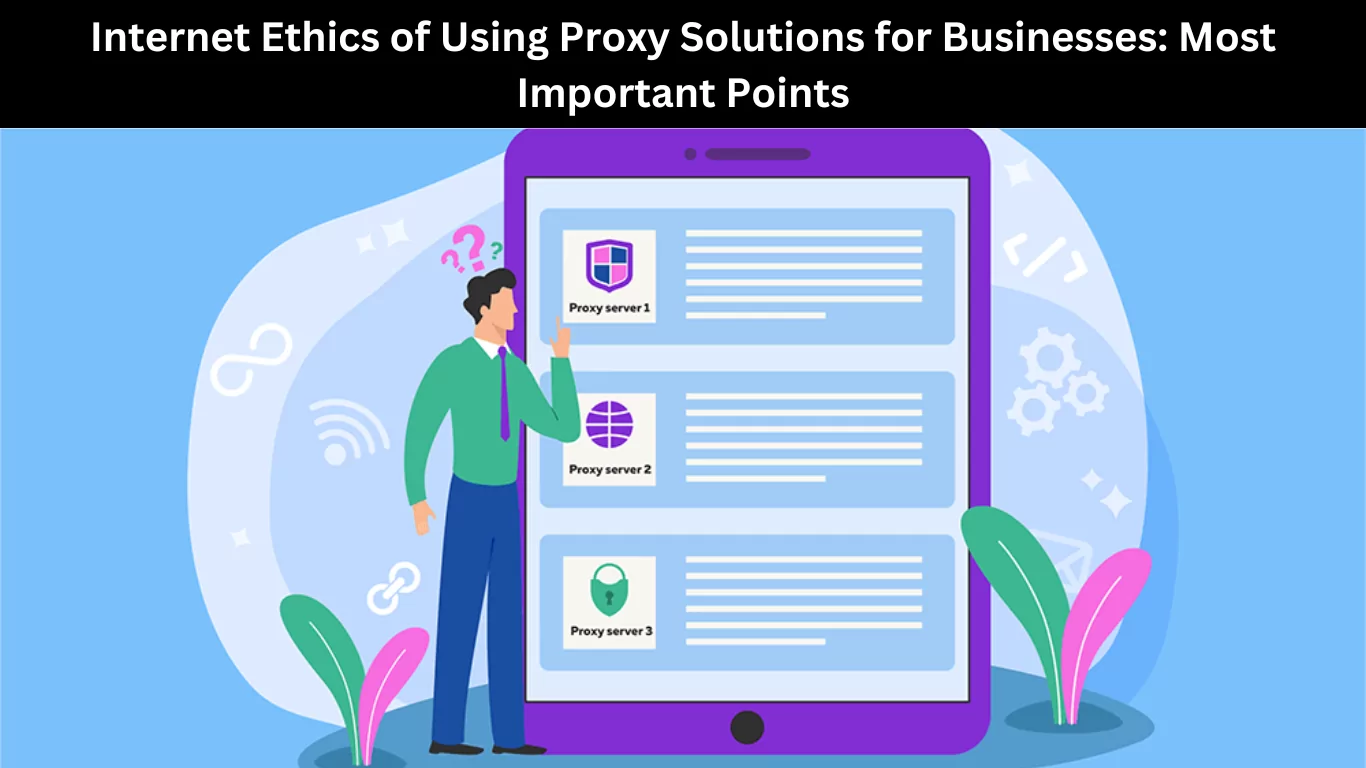In today’s digital landscape, businesses often leverage proxy solutions as integral tools in their online operations. From transparency and industry standards to practical insights from my years of experience in the field, this exploration aims to equip developers, businesses, students, and everyday users with a nuanced understanding of the internet ethics surrounding using proxy solutions. Let’s embark on this journey to navigate the complexities and opportunities presented by this indispensable technology.
Understanding Proxy Solutions
Proxy solutions act as intermediaries between users and the internet, functioning as gateways facilitating communication between devices and web servers. They are pivotal in enhancing online security privacy and optimizing web performance for businesses. By concealing actual IP addresses, proxies provide a layer of anonymity, safeguarding sensitive information from potential threats.
Businesses strategically employ them for diverse purposes. For instance, proxies play a crucial role in automating and diversifying Craiglist Ads postings in online advertising. This approach allows businesses to reach broader audiences while maintaining discretion and avoiding potential restrictions. Moreover, proxies contribute to load balancing, content filtering, and data caching, demonstrating their versatility in streamlining and fortifying various online activities for modern enterprises.
Remember that proxies are not ideal, though! They might be ineffective or malfunctioning. To minimize that risk, I recommend this Proxy checker — that tool lets you check a proxy for effectiveness for FREE!
Advantages of Using Proxy Solutions
Proxies protect against cyber threats and unauthorized access by concealing IP addresses and safeguarding sensitive business information. Another notable advantage lies in the increased anonymity afforded by proxy solutions. Businesses can navigate the online realm discreetly as proxies mask their digital footprint. That deters potential threats and contributes to a more secure and private online experience.
Furthermore, they enable businesses to overcome geolocation blocking, a common challenge in the global online landscape. By strategically routing internet traffic through servers in different locations, businesses can access region-restricted content, expanding their reach and operational capabilities on a global scale. This flexibility proves indispensable for enterprises with diverse international operations, allowing them to navigate geographical barriers seamlessly.
Common Use Cases in Business
Proxy solutions in business manifest in various practical applications, enhancing operational efficiency and security. A primary use case involves web scraping for market research, where proxies enable discreet data collection from online sources. That empowers businesses to stay abreast of industry trends, competitor strategies, and consumer behavior, providing valuable insights for informed decision-making.
For global enterprises, these solutions are pivotal in accessing geo-restricted content. Whether expanding market reach or maintaining an international online presence, proxies enable seamless navigation of content restrictions. That ensures businesses can operate effectively globally, accessing necessary information and resources regardless of geographical limitations. Additionally, they serve as a defense in cybersecurity by acting as a barrier between a business’s internal network and the external internet. This extra layer of security helps mitigate the risk of cyber threats and unauthorized access, safeguarding sensitive data and fortifying the organization’s overall cybersecurity posture.
Ethical Concerns and Challenges
The ethical considerations tied to proxy solutions are intricate, encompassing privacy implications, potential misuse, and legal nuances. Concerns arise regarding user privacy as proxies enable anonymous internet browsing. While this safeguards personal information, it also introduces the risk of malicious exploitation, allowing bad actors to leverage the anonymity provided by proxies for unauthorized access and cyber threats.
The potential misuse of proxies for malicious activities adds a layer of ethical complexity. From cyber attacks to evading content restrictions, the features that make proxies valuable for businesses could be exploited for nefarious purposes. To address these challenges, businesses adopting proxy solutions must implement robust security measures and vigilant monitoring to prevent misuse. Additionally, the legal landscape varies across jurisdictions, requiring businesses to navigate diverse regulations.
Responsible Proxy Use Guidelines
Crafting responsible proxy use guidelines is imperative for businesses integrating these tools. Employees should adhere to clear rules, emphasizing ethical and secure practices. These guidelines should outline acceptable activities, prohibiting malicious or unauthorized actions.
Monitoring and auditing proxy activities are vital components of responsible use. Regular checks on proxy usage patterns enable prompt identification of anomalies or potential misuse. Implementing robust monitoring systems provides ongoing visibility into network traffic, ensuring proxies are employed for legitimate and authorized purposes.
Additionally, strict compliance with local and international laws is non-negotiable. Businesses must stay updated on the legal landscape surrounding proxy use in their operating jurisdictions, adapting guidelines swiftly to legal changes. This commitment to legal compliance aligns with societal expectations and safeguards businesses against legal repercussions, forming a comprehensive framework for ethical and responsible proxy utilization.
Transparency and Disclosure
Transparency and disclosure are fundamental aspects of responsible proxy use within businesses. Internally, employees should be well-informed about the company’s proxy policies, creating a culture that emphasizes these tools’ legitimate and authorized use. That sets clear expectations and cultivates a sense of responsibility among team members.
Externally, businesses must openly communicate their use of proxies in online activities, especially in client and stakeholder interactions. This disclosure builds trust by assuring clients of the organization’s commitment to ethical practices, particularly in industries where data security and privacy are major concerns. Providing specific details on how proxies are utilized responsibly can further enhance transparency.
Final Words
Ethical use of proxy solutions is vital for businesses that balance benefits with potential risks. Clear guidelines for employees, robust monitoring systems, and compliance with local and international laws are essential. Both internally and externally, transparency and disclosure build trust with clients and stakeholders.
And now, best of luck!
